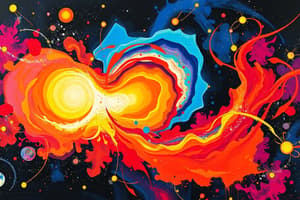Podcast
Questions and Answers
What significant event is believed to have occurred around 14 billion years ago?
What significant event is believed to have occurred around 14 billion years ago?
- The formation of the first planet
- The creation of the solar system
- The beginning of life on Earth
- The Big Bang (correct)
Which elements began to form shortly after the Big Bang?
Which elements began to form shortly after the Big Bang?
- Hydrogen and Helium (correct)
- Neon and Argon
- Iron and Lithium
- Carbon and Oxygen
What occurred after several billion years following the formation of the early elements?
What occurred after several billion years following the formation of the early elements?
- Formation of galaxies
- Formation of planets (correct)
- Creation of water
- Observation of cosmic background radiation
What states can water exist in on newly formed planets?
What states can water exist in on newly formed planets?
What characterized the initial period of the universe after the Big Bang?
What characterized the initial period of the universe after the Big Bang?
Flashcards are hidden until you start studying
Study Notes
The Big Bang
- The universe began approximately 14 billion years ago.
- The initial state of the universe was an incredibly dense and hot point, similar to the size of a grain of sand.
- An explosive expansion, known as the Big Bang, marked the beginning of the universe.
- The universe continues to expand and evolve constantly.
- The initial period after the Big Bang was quiet due to the absence of air.
Formation of Early Elements
- Hydrogen and Helium, the fundamental building blocks of matter, formed within minutes after the Big Bang.
- The aggregation of matter led to the formation of stars.
Formation of Planets
- Planets, including those containing water, started forming billions of years after the Big Bang.
- Water can exist in different states: frozen as ice, liquid water, and as water vapor.
Studying That Suits You
Use AI to generate personalized quizzes and flashcards to suit your learning preferences.




